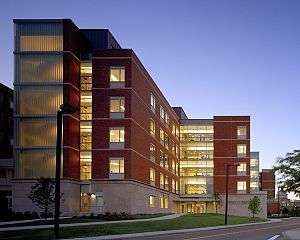The Institute of Optics
The Institute of Optics is a department and research center at the University of Rochester in Rochester, New York. The Institute grants degrees at the bachelor's, master's and doctoral levels through the University of Rochester School of Engineering and Applied Sciences. Since its founding, the Institute has granted over 2,400 degrees in optics, making up about half of the degrees awarded in the field in the U.S. The Institute is made up of 16 full-time professors, 8 professors with joint appointments in other departments, 5 adjunct professors, 12 research scientists, 11 staff, about 100 undergraduate students and about 100 graduate students.[1]

According to the National Research Council, in its latest ranking of physics departments, the Institute of Optics was ranked 25th in the nation.
History
Founded in 1929, through a grant from Eastman Kodak and Bausch and Lomb, the Institute is the oldest educational program in the United States devoted to optics.[2][3] During World War I, many American defense companies relied heavily on German optics. The need for an American-based institution of optical training became apparent when the flow of German imports, including optics, attenuated.
The Institute of Optics has long been deeply involved in American optics study and research. The Optical Society of America was founded in 1916 by 30 optical scientists and instrument makers based in Rochester.
The proximity of Rochester to many optical companies has provided an excellent environment for collaboration with industry, as well as funding for research. These companies include Xerox, Eastman Kodak, Corning Glass Works, Bausch and Lomb, and many others.
The Institute of Optics occupied the top floor of Bausch and Lomb Hall from 1931 to 1977. Currently, the Institute is primarily housed in the Wilmot Building on the River Campus of the University of Rochester; construction began in 1961 with support from NASA, as well as other buildings and centers, including the Laboratory for Laser Energetics. The Institute successfully expanded into the new Robert B. Goergen Hall for Biomedical Engineering and Optics, which was completed in March 2007 and was dedicated on May 17, 2007.[4]
In 2018, Donna Strickland, became the Institute's first alumni to become a Nobel Laureate, winning the Nobel Prize in Physics with former Institute Professor Gérard Mourou.
Notable faculty
- Late Professor Leonard Mandel: Pioneer in the field of quantum optics, first demonstrated photon self interference, discovered the Mandel Formula.
- Late Professor Rudolf Kingslake: Pioneer in the field of lens design, founding faculty member.
- Late Professor Robert E. Hopkins: Pioneer in the field of optical engineering, former director and founder of Tropel Corporation.
- Late Professor M. Parker Givens: Director of the Institute from 1975 to 1977
- Late Professor Stephen Jacobs: Pioneer in Liquid Crystals, and in Magneto-Rheological Finishing.
- Late Professor Emil Wolf: Pioneer in the field of coherence theory and quantum optics, predicted the Wolf Effect.
- Professor P. Scott Carney: Director of The Institute and Pioneer in the field of physical optics.
- Professor Robert W. Boyd: Pioneer in the field of non-linear optics.
- Professor Joseph H. Eberly: Pioneer in the field of quantum optics and former President of the Optical Society of America.
- Professor Carlos Stroud: Pioneer in the field of quantum optics and Quantum Information.
- Professor James Zavislan: Professor of Optics, Biomedical Engineering and Ophthalmology.
- Professor James Fienup: Pioneer in optical imaging and phase retrieval.
- Former Professor Lukas Novotny: Pioneer in nano-optics.
- Professor Chunlei Guo: Pioneer in femtosecond laser processing of materials.
- Professor Thomas G. Brown: Noted for the study of unconventional polarization states of light and academic co-lead for Test, Assembly and Packaging in AIM Photonics.
- Professor Jannick Rolland: Director of the Center for Freeform Optics and the Robert E. Hopkins Center for Optical Design and Engineering.
- Professor Wayne H. Knox: Former Director of the Advanced Photonics Research Department at Bell Labs
- Former Professor Ian Walmsley: Co-invented Spectral phase interferometry for direct electric-field reconstruction (SPIDER) while at Rochester, formerly of the University of Oxford Department of Physics, currently Provost of Imperial College (London UK).
Research Areas
- Biomedical optics
- Coherence theory
- Fiber optics
- Quantum optics
- Laser physics
- Polarization
- Non-linear optics
- Laser-based nuclear fusion
- Nanotechnology
References
- The Institute of Optics: About the Institute
- Labs for the 21st Century: Archived 2007-04-17 at the Wayback Machine Partnership Program
- T. Russell Wilkins, "The Institute of Applied Optics of the U. of R.," The Journal of the Optical Society of America, XXI (1931), 369-387. Anon., "Unusual Optical Development made Possible by Cooperation of Local Industries," RAR, VII (1929), no. 3, 72-73.
- University of Rochester: Office of the President: Diversity Task Force Report: State of the University Presentation to the Faculty Senate